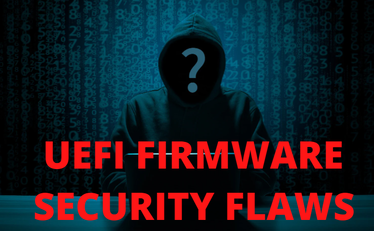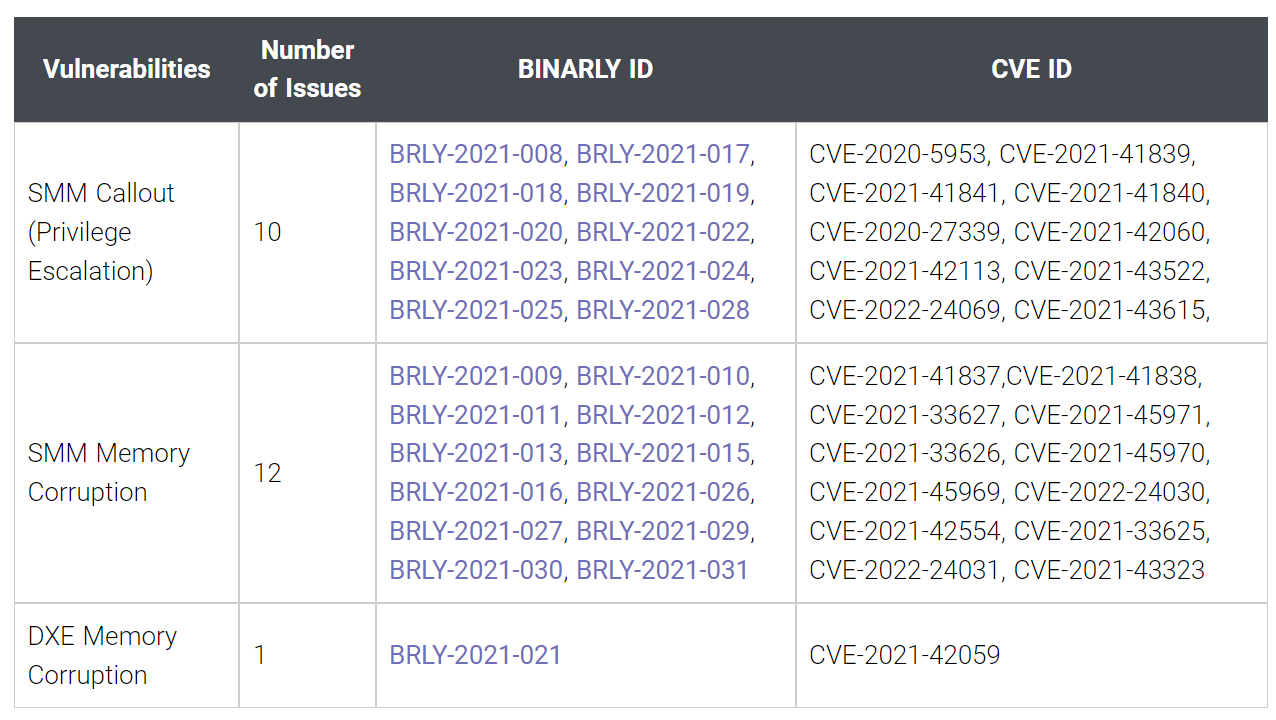 Overview: According to Binarly, the 23 high-severity vulnerabilities could impact millions of enterprise devices, such as laptops, servers, routers, network appliances, industrial control systems (ICS), and edge computing devices. There are more than 25 affected vendors, including HP, Lenovo, Fujitsu, Microsoft, Intel, Dell, Bull (Atos) and Siemens. Vulnerability Description: UEFI software provides an extensible interface between an operating system and platform firmware. UEFI software uses a highly privileged processor execution mode called System Management Mode (SMM) for handling system-wide functions like power management, system hardware control, or proprietary OEM-designed code. SMM's privileges, also referred to as "Ring -2," exceed the privileges of the operating system's kernel ("Ring-0"). For this reason, SMM is executed in a protected area of memory called the SMRAM. It is typically accessed via System Management Interrupt (SMI) Handlers using communication buffers, which are also known as "SMM Comm Buffers." The SMM also provides protection against SPI flash modifications and performs boot time verifications similar to those performed by SecureBoot. UEFI software requires both openness (for hardware drivers, pluggable devices and Driver eXecution Environment (DXE) updates) as well as very tight security controls (for e.g., SMM Comm Buffer Security), making it a complex software that needs a thorough set of security controls that need validation throughout the software's lifecycle. UEFI also supports recent capabilities like Virtual Machine Manager (VMM) for virtualization and the increasing demand of virtual computing resources. Insyde's H2O UEFI firmware contains several (23) memory management vulnerabilities that were disclosed by Binarly. While these vulnerabilities were discovered in Fujitsu and Bull Atos implementations of Insyde H2O software, the same software is also present in many other vendor implementations due to the complex UEFI supply chain. The vulnerabilities can be classified by the following UEFI vulnerability categories. Impact:
The impacts of these vulnerabilities vary widely due to the nature of SMM capabilities. As an example, a local attacker with administrative privileges (or a remote attacker with administrative privileges) can exploit these vulnerabilities to elevate privileges above the operating system to execute arbitrary code in SMM mode. These attacks can be invoked from the operating system using the unverified or unsafe SMI Handlers, and in some cases these bugs can also be triggered in the UEFI early boot phases ( as well as sleep and recovery like ACPI) before the operating system is initialized. In summary, a local attacker with administrative privileges (in some cases a remote attacker with administrative privileges) can use malicious software to perform any of the following:
Solution: Install the latest stable version of firmware provided by your vendor or your nearest reseller of your computing environments. If your operating system supports automatic or managed updates for firmware, such as Linux Vendor Firmware Service (LVFS), apply the related software security updates.
0 Comments
Your comment will be posted after it is approved.
Leave a Reply. |
- Home
- Solutions
- Services
-
Company
- About Us
- Secure Your Future with Armoryze
- Customer Success Story
-
Free Resources
>
- Win With Armoryze
- Whitepaper - How To Prioritize Risk Across the Attack Surface
- The Ultimate Guide to Achieving Cyber Essentials Plus Certification
- ISO 27001 Implementation Checklist
- Whitepaper - What is Credential Stuffing? How To Prevent Credential Stuffing Attacks.
- eBook: Effective Security Strategies for Devops & Application Services
- eBook - How To Build A Next Generation SOC
- Free Cyber Security Assessment & Consultation
- Free Trial >
- Careers >
- Business Terms & Conditions
- Contact Us
- Blog
- Privacy-Policy
- SHOP


